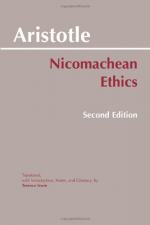|
This section contains 994 words (approx. 3 pages at 400 words per page) |

|
Happiness
Happiness is the thing that all humans strive toward, Aristotle proposes. In all decisions and in all things, the end goal is happiness. People may wish for other things, but these things are just a means to bring happiness. Happiness is something that is wanted for itself, not because it leads to something else, and so it is "complete."
In Book I, Aristotle bases his inquiry into ethics on the idea of happiness because it is complete in this way. It informs every decision that a rational being makes. Rationality is a distinctly human trait, so thus happiness is the proper thing on which to build an account of proper virtuous behavior. In fact, as Aristotle concludes in Book X, this rationality is what leads to the greatest happiness.
Happiness is not the same as pleasure, Aristotle claims. Pleasure is not complete, because something that is pleasing can...
|
This section contains 994 words (approx. 3 pages at 400 words per page) |

|




